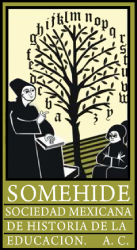Proposal for educational intervention: Pedagogical content knowledge for the teaching of History in the “Dr. Gustavo Baz Prada” Elementary School
DOI:
https://doi.org/10.29351/amhe.v2i1.285Keywords:
Teaching knowledge, formative approach, evaluation and teacher trainingAbstract
The present article is part of a broader investigation, in which we analyzed some of the problems faced by the teachers of “Dr. Gustavo Baz Prada” Elementary School in regards to teaching the subject of History, since they didn’t use the formative approach in their practice, and instead they promoted the traditional approach for teaching history, so the investigation was directed towards starting a new proposal for educational intervention (Barraza, 2010); therefore, a seminar for the teaching of history was designed, implemented and evaluated under the formative approach area of study, during the 2017-2018 school year. For this cause, the contributions of Shulman (2005) regarding the teachers’ knowledge and their particular didactic knowledge of content were gathered. As pointed out, the objective of the research is: To assess whether the design and implementation of the Seminar of History contributes to the training of the teachers, their knowledge, and especially to the pedagogical knowledge of the content for teaching history under the formative approach in the third and fifth grades of “Dr. Gustavo Baz Prada” Elementary School. As for the methodological and theoretical aspect, the type of research corresponds to evaluation research (Hurtado, 2000) and the research design corresponds to research-action of pragmatism (Hurtado, 2010), because it aims to solve immediate everyday problems and to improve concrete practices. During the research process, questionnaires were applied, and observation visits were made to the groups, in order to evaluate them, a rubric and an interview were applied to teachers; several secondary sources were also consulted related to the teaching of history, teaching of knowledge, and the training approach and around the disciplinary content of the study programs.
References
Ahumada, P. (2005). La evaluación auténtica: un sistema para la obtención de evidencias y vivencias de los aprendizajes. Perspectiva Educacional, (45), 11-24. Recuperado de: https://www.redalyc.org/pdf/3333/333329100002.pdf.
Barraza, M. (2010). Elaboración de propuestas de intervención educativa. Durango: Universidad Pedagógica de Durango.
Coneval (2010). Pobreza a nivel municipio 2010. Recuperado de: http://www.coneval.org.mx/Medicion/Paginas/Medici%C3%B3n/Informacion-por-Municipio.aspx.
Díaz Barriga, F. (2005). Enseñanza situada: vínculo entre la escuela y la vida. México: McGraw-Hill.
Galván, L. E. (2006). Teoría y práctica en la enseñanza de Clío. En La formación de una conciencia histórica: enseñanza de la historia en México (pp. 219-241). México: Academia Mexicana de la Historia.
Hurtado, J. (2000). Metodología de investigación holística (3a. ed.). Caracas: Editorial Sypal.
Hurtado, J. (2010). Guía para la comprensión holística de la ciencia (3a. ed., parte II). Caracas: Editorial Sypal.
Imbernón, F. (2012). La investigación sobre y con el profesorado. La repercusión en la formación del profesorado, ¿cómo se investiga? Revista Electrónica de Investigación Educativa, 14(2), 1-9. Recuperado de:
http://redie.uabc.mx/vol14no2/contenido-imbernon2012.html.
Imbernón, F., Gimeno Sacristán, J., Rodríguez Martínez, C., y Sureda, J. (2017). El profesorado, su formación y el trabajo educativo. Recuperado de: http://feae.eu/wp-content/uploads/2017/11/F.-Imbern%C3%B3n-J.G.-Sacrist%C3%A1n-y-otros.pdf.
Ravela, P. (2013). La evaluación de y en la educación. Boletín del Instituto Nacional de Evaluación Educativa, (1). Recuperado de: https://www.ineed.edu.uy/images/pdf/Aristas-La-evaluacin-de-y-en-la-educacin-I.pdf.
Sánchez, A. (1993). El sentido de la enseñanza de la historia. Tempus: Revista de Historia de la Facultad de Filosofía y Letras, (1), 175-184. Recuperado de: http://ru.ffyl.unam.mx/bitstream/handle/10391/1035/09_Tempus_1_%201993_Sanchez_175-184.pdf?sequence=1&isAllowed=y.
Sánchez, A. (2006). Reflexiones sobre la historiografía que se enseña. En La formación de una conciencia histórica: enseñanza de la historia en México (pp. 19-45). México: Academia Mexicana de la Historia.
Shulman, L. S. (2005). Conocimiento y enseñanza: fundamentos de la nueva reforma. Profesorado. Revista de Currículum y Formación del Profesorado, 9(2), 1-30. Recuperado de: https://www.ugr.es/~recfpro/rev92ART1.pdf.
Downloads
Published
How to Cite
Issue
Section
License
Todos los contenidos del Anuario Mexicano de Historia de la Educación se publican bajo una licencia Creative Commons Atribución No Comercial 4.0 Internacional (CC BY-NC 4.0), que permite compartir (copiar y redistribuir el material en cualquier medio o formato) y adaptar (remezclar, transformar y construir a partir del material) para fines no comerciales, dando los créditos a los autores y a la revista, tal como lo establece la licencia.
La política de acceso abierto y de licencias con “algunos derechos reservados” no niega la propiedad intelectual ni los derechos de los autores respecto a sus artículos, pues ellos son los titulares, en tanto que el Anuario Mexicano de Historia de la Educación no los reserva para sí ni para la institución editora, ya que se apegan a movimientos de acceso abierto como los Principios y Valores del Sistema de Información Científica Redalyc - Red de Revistas Científicas de América Latina y el Caribe, que pugnan por la eliminación de las políticas de embargo para que el autor retenga los derechos de su obra (principio número 8). Así como las políticas de acceso abierto del Directory of Open Access Journals (DOAJ).
Los autores podrán distribuir su propio material en cualquier otro medio o soporte, siempre y cuando sea para fines no comerciales, informando a los editores que el trabajo será publicado nuevamente y dando el crédito correspondiente al Anuario Mexicano de Historia de la Educación.
La publicación en el Anuario Mexicano de Historia de la Educación, por su carácter gratuito, no da derecho a remuneración económica alguna a los autores, ni a los dictaminadores.
Los lectores podrán reproducir (copiar), comunicar, distribuir o hacer obras derivadas de los artículos o colaboraciones publicados en el Anuario Mexicano de Historia de la Educación en los siguientes casos:
- Para fines públicos.
- Sin fines comerciales.
- Que se reconozca la autoría de la obra y se cite su origen con información completa: Apellido/s del autor, inicial/es del nombre/s. (año de publicación). Título del artículo. Nombre de la revista, volumen (número de ejemplar), página inicial del artículo-página final del artículo. DOI o URL (formato sugerido de acuerdo al estilo APA en su versión más reciente).
El cuerpo editorial del Anuario Mexicano de Historia de la Educación asumirá el compromiso de notificar oportunamente a los autores sobre cualquier cambio de ubicación de los artículos en el sitio (cambio de dirección URL o de conexiones para identificar el artículo).
Los autores, al enviar sus trabajos para su posible publicación, deberán tomar en cuenta los puntos anteriores, mismos que se contemplan en el Acuerdo entre autor y el Anuario Mexicano de Historia de la Educación.











